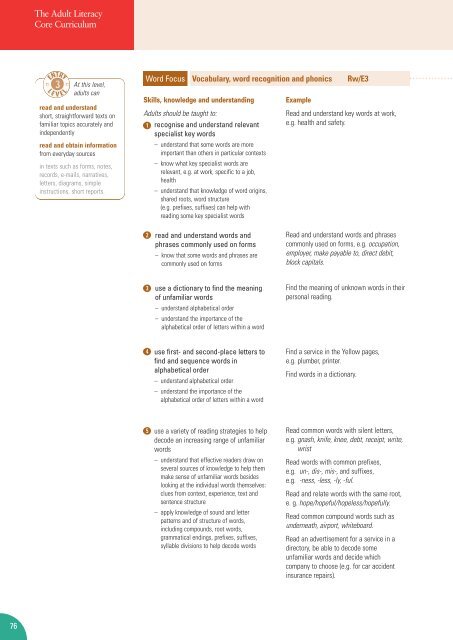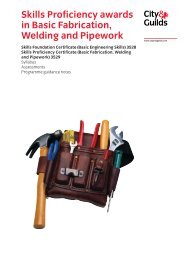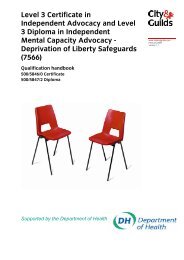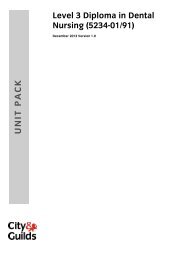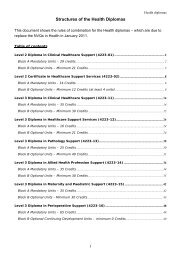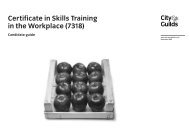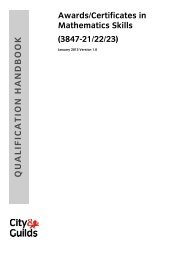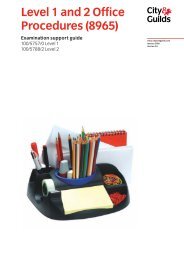Adult Literacy Core Curriculum - Nationally developed Skills for Life ...
Adult Literacy Core Curriculum - Nationally developed Skills for Life ...
Adult Literacy Core Curriculum - Nationally developed Skills for Life ...
Create successful ePaper yourself
Turn your PDF publications into a flip-book with our unique Google optimized e-Paper software.
76<br />
The <strong>Adult</strong> <strong>Literacy</strong><br />
<strong>Core</strong> <strong>Curriculum</strong><br />
At this level,<br />
adults can<br />
read and understand<br />
short, straight<strong>for</strong>ward texts on<br />
familiar topics accurately and<br />
independently<br />
read and obtain in<strong>for</strong>mation<br />
from everyday sources<br />
in texts such as <strong>for</strong>ms, notes,<br />
records, e-mails, narratives,<br />
letters, diagrams, simple<br />
instructions, short reports.<br />
Word Focus Vocabulary, word recognition and phonics Rw/E3<br />
<strong>Skills</strong>, knowledge and understanding<br />
<strong>Adult</strong>s should be taught to:<br />
1 recognise and understand relevant<br />
specialist key words<br />
– understand that some words are more<br />
important than others in particular contexts<br />
– know what key specialist words are<br />
relevant, e.g. at work, specific to a job,<br />
health<br />
– understand that knowledge of word origins,<br />
shared roots, word structure<br />
(e.g. prefixes, suffixes) can help with<br />
reading some key specialist words<br />
2<br />
3<br />
4<br />
5<br />
read and understand words and<br />
phrases commonly used on <strong>for</strong>ms<br />
– know that some words and phrases are<br />
commonly used on <strong>for</strong>ms<br />
use a dictionary to find the meaning<br />
of unfamiliar words<br />
– understand alphabetical order<br />
– understand the importance of the<br />
alphabetical order of letters within a word<br />
use first- and second-place letters to<br />
find and sequence words in<br />
alphabetical order<br />
– understand alphabetical order<br />
– understand the importance of the<br />
alphabetical order of letters within a word<br />
use a variety of reading strategies to help<br />
decode an increasing range of unfamiliar<br />
words<br />
– understand that effective readers draw on<br />
several sources of knowledge to help them<br />
make sense of unfamiliar words besides<br />
looking at the individual words themselves:<br />
clues from context, experience, text and<br />
sentence structure<br />
– apply knowledge of sound and letter<br />
patterns and of structure of words,<br />
including compounds, root words,<br />
grammatical endings, prefixes, suffixes,<br />
syllable divisions to help decode words<br />
Example<br />
Read and understand key words at work,<br />
e.g. health and safety.<br />
Read and understand words and phrases<br />
commonly used on <strong>for</strong>ms, e.g. occupation,<br />
employer, make payable to, direct debit,<br />
block capitals.<br />
Find the meaning of unknown words in their<br />
personal reading.<br />
Find a service in the Yellow pages,<br />
e.g. plumber, printer.<br />
Find words in a dictionary.<br />
Read common words with silent letters,<br />
e.g. gnash, knife, knee, debt, receipt, write,<br />
wrist<br />
Read words with common prefixes,<br />
e.g. un-, dis-, mis-, and suffixes,<br />
e.g. -ness, -less, -ly, -ful.<br />
Read and relate words with the same root,<br />
e. g. hope/hopeful/hopeless/hopefully.<br />
Read common compound words such as<br />
underneath, airport, whiteboard.<br />
Read an advertisement <strong>for</strong> a service in a<br />
directory, be able to decode some<br />
unfamiliar words and decide which<br />
company to choose (e.g. <strong>for</strong> car accident<br />
insurance repairs).


